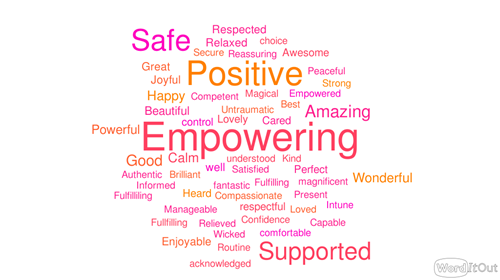The power of words
By RCM Research Fellow Juliet Rayment Midwives NHS Pregnancy Maternity Safety
The language we use – whether in clinical notes or with the women and families in our care – matters. For the past few months, RCM Research Fellow Juliet Rayment has been working on a project to find a shared vocabulary around labour and birth. Here she reflects on that, and urges RCM members to get involved.
The Re:Birth project, which is coming to its final stages, has offered a space for listening and discussion around the language we use around birth that has become increasingly difficult on social media and other platforms. Perhaps that is why hundreds of people who took part in the Voices Survey didn’t hold back, sharing thoughts, experiences, and feelings about the language we use to describe different types of birth. Those who participated in Listening Groups had respectful, complex and insightful conversations about this emotive topic.
Everyone who shared their stories wanted labour and birth to be physically and psychologically safe. That is, for women and babies to have good outcomes, and also feel that their wishes were heard, understood, respected and responded to. Health professionals had a clear and shared vision for how they wanted birth to be for those in their care and here are some of the key takeaways:


Language is not just words. We have heard how clear language, helps ensure safe care for women and birthing people. It helps women make informed choices and supports health professionals to communicate with each other. When health professionals choose words to discuss a woman’s birth that are not in her chosen vocabulary or birth plan, this can leave her feeling unheard or misunderstood:
"When they were saying to me you’re fine and my body was screaming you’re really not, I didn’t know who to listen to.” – Service user/rep, Listening Group.
Through the Listening Groups and Voices Survey we have been given many different terms to describe all types of birth. All of these were problematic in some way to some people, and it will be little surprise that there was no one term that everyone agreed should be used. Instead, service users and health professionals asked for terms to describe labour and birth that:
- are clear, descriptive and unambiguous
- can be consistently understood by both service users and professionals
- avoid judgement and don’t imply that one type of labour and birth is better than another
- reflect women and birthing people’s actual experience, not what health professionals assume their experience to be
- allow for the identification of differences in the mode of labour and birth (e.g. ‘vaginal birth’ or simply ‘birth’ would be too general).
When it comes to conversations about birth, asking questions like ‘how was your birth for you?’ rather than ‘did you have a normal birth last time?’ opens up the space for women to describe their experience and for them to lead with the words they prefer to use to talk about that birth.
In the project’s final survey, we want to know which terms you think should be used in clinical notes, research and audit. This is not just for health professionals or researchers: it’s relevant to everyone. Service users were very keen to highlight to us examples of language that had spilled out of clinical notes. Phrases like failure to progress or being called the failed homebirth were read in notes, used within women’s earshot, or in some cases directly to them. They were upsetting and unnecessary.
We want to make sure there is consistency and respectful language used across the board. To make that happen, everyone needs their say. Take part in the final survey.
